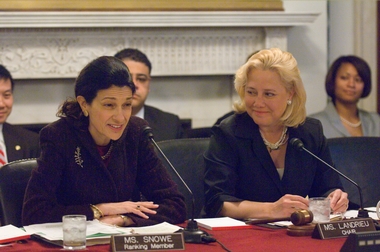
For Republican Senator Olympia Snowe, who unexpectedly announced that she would not be running for re-election in 2012, the recent debate over contraception coverage may have been the straw that broke the camel’s back. Snowe, a three-term senator who is well-regarded for her moderate views and tendency toward bipartisan coalition-building, was the only Republican senator to vote against an amendment that would have allowed any employer to deny medical coverage for services it objected to on religious grounds.
The vote came just two days after Snowe’s declaration, which shocked Republican leaders. It was clear that Snowe had been mulling her decision for quite some time, and her departure represents just the latest addition to a growing list of moderates from both parties. Now, even though the Tea Party’s national influence appears to be ebbing, its legacy is clearly felt in Congress, at least according to Snowe.
According to Rhode Island Gov. Lincoln Chafee, another moderate who served with Snowe in the Senate before leaving the Republican Party to become an Independent, “Senator Snowe wants to focus on bringing down the deficit and getting the economy on track, and that’s where the priorities should be.”
Snowe’s early retirement (she’s only 65) surprised many, but should it have? According to the National Election Study, the percentage of self-identified Republicans who claim to be “moderate” or “middle of the road,” has fallen precipitously. In 1972, one-quarter of Republicans identified as moderate while only 14% did so in 2008. The number of Republicans identifying as conservative increased dramatically during this period, from 22% to 52%. By contrast, the percentage of Democrats identifying as liberal has only increased by 10 points since the early 1970s. And it matters. There are big differences in the views of moderate/liberal Republicans and conservative Republicans:
- A majority (56%) of moderate/liberal Republicans think that abortion should be legal in all or most cases, compared to only 29% of Tea Party identifiers and 28% of conservative Republicans.
- Fully 7-in-10 moderate/liberal Republicans favor a tax hike on Americans making more than $1 million a year (President Obama’s “Buffett Rule”), compared to only 4-in-10 Tea Party identifiers and 43% of conservative Republicans.
- Half of moderate/liberal Republicans favor allowing gay and lesbian couples to marry legally, compared to only 22% of Tea Party identifiers and fewer than 1-in-5 (19%) conservative Republicans.
These divides are not as pronounced when it comes to issues like reducing the deficit, creating jobs, or protecting Social Security – indeed, they’re often nonexistent. Republicans who support abortion rights are increasingly difficult to find, and Rick Santorum’s rapid rise to challenge Mitt Romney shows just how powerful a polarizing, social issues-focused platform can be. In today’s Congress, it seems, compromise is not in vogue. What this portends for the Republican Party is an open question. But in the absence of dealmakers like Snowe, it’s hard to imagine how Congress will get anything done.